MENNO VON BRUCKEN FOCK
MILLA KAPOLKE, historie Grobschnitt
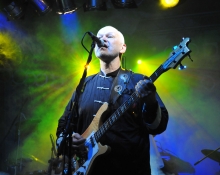
Grobschnitt were formed in 1970 by several members of a band called Crew, including Stefan ‘Wildschwein’ Daneliak (vocals, guitar), Joachim ‘Eroc’ Ehrig (drums) and Gerd Otto ‘Lupo’ Kuhn (guitars, vocals). This nucleus later added Axel Harlos (drums), Bernard ‘Bär’ Uhlemann (bass) and Hermann Quetting (keyboards). On their debut record, Grobschnitt (1972), the band played fairly straightforward progressive rock, rather unsuccessful both with critics as well as the record buyers. After this release both Harlos and Quetting left. The group added Volker ‘Mist’ Kahr on keyboards. Deciding to carry on, the band adapted a new state persona, filled with bizarre costumes and theatrical performances that even featured their roadies. This was largely the work of Eroc. The band focused a bit more on the space rock sound on their second album, Ballermann (1974), which originally consisted of two LPs: one filled with symphonic progressive rock, the other was given all to a space rock suite called Solar Music. Their third album, Jumbo (1975), was released in both English and German versions and found Grobschnitt moving closer to symphonic progressive rock as their famous contemporaries Yes and Genesis used to play, with a number of epic tracks. More or less in the same vein was the concept album Rockpommel's Land (1977), which even featured a cover that was reminiscent of Roger Dean. A fairy tale about a boy's adventures in a strange land. Solar Music Live (1978) was the first live album by the band, featuring a live recreation of the Solar Music suite off their second album. The band shifted towards a harder rocking psychedelic feel with Merry Go Round (1979) and even less pschycedelic in Illegal (1981). By Razzia (1982), the group had abandoned many of their more progressive tendencies as drummer Eroc had left the group. Their later records in the eighties were far more conventional keyboard-dominated pop records.1989 saw the last performance of the band.
Current line up of the band: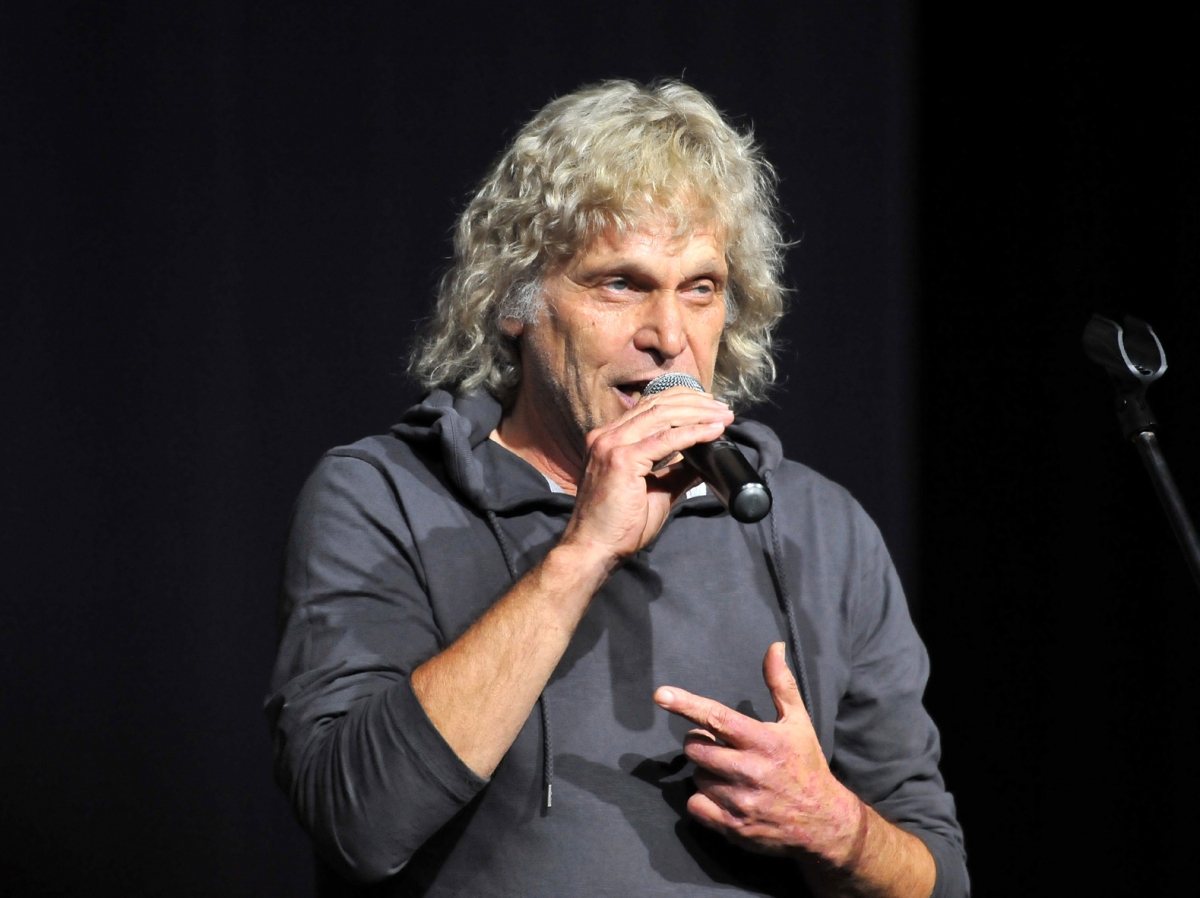
Willi Wildschwein (Stefan Danielak): vocals, acoustic guitar, Milla Kapolke: bass, Moog Taurus, background vocals, Admiral Top Sahne (Rolf Möller): drums, Toni Moff Mollo: vocals, lightshow, Deva Tattva: keyboards, Nuki: electric guitar, background vocals, Manu Kapolke: electric and acoustic guitars, background vocals, Demian Hache: drums, percussion, keyboards
The thoughts about playing Grobschnitt music date from 2005. In the mean time you are on the road for three years now, after the first two test gigs since 2007. Is it still fun?
"Absolutely! I think tonight will be our 27th show and indeed it's a lot of fun playing in this line-up. At first we played a different show, the living proof of those shows is our previous album Grobschnitt Live 2008. Then we changed the show and tonight will be the eighth show centered around the extended version of Rockpommel’s Land. Since we don’t play live that often, we can still count on may people in the audience, though not all of the shows are sold out! It’s rather unique to have four of our sons involved and I must say we are working together very well. Bully, one of Willi’s boys, is our sound engineer, the other three are on stage with us and although it’s challenging, we all seem to like it very much. Of course they have been raised surrounded by music but in contrast to many musicians of our generation they have had a proper musical education. My son for example has been taught to play the piano from a very young age and he plays guitar for many years now as well."
Volker 'Mist' passed away in 2008, but what happened to Lupo? Was he invited to join?
"Yes, we contacted Lupo a few years ago, but we found out that when Grobschnitt ceased to exist, he stopped playing music permanently and went on to do different things. I think it has something to do with management. We asked him if he would like to be part of this reunion thing but he declined: he wasn’t interested at all."
Which album or albums was/were the most successful for Grobschnitt? Do you still play pieces of the first two albums?
"Solar Music and then Rockpommel’s Land were by far the most successful albums. I think we have always played Solar Music live with all of our shows. The 2008 live album features a re-arranged version of Solar Music, which is part of our second album Ballermann. Apart from Solar Music we don’t play anything else from those first two albums. We also played songs from Jumbo. The current show has been taped and features the extended version of Rockpommel’s Land. The release is scheduled for April or May 2010. The actual show however is much longer and we play pieces of Illegal and Razzia next to another reworked version of Solar Music."
On the live album Volle Molle are some tracks with titles I couldn't find on the studio albums like Snowflakes, Wuppertal Punk, Beifall and Waldeslied.
Snowflake is a piece that is only on Volle Molle but for example Wuppertal Punk is more or less an improvisation based on one of the songs from the first album. We still like to improvise and the piece we often do that in is Solar Music."
Grobschnitt is known for all the nicknames of the band members. Why did most of you change your names? Can you tell us something about all the line-up changes?
"Well, at the time the founding members of Grobschnitt started to play in bands, they were still schoolboys and very young: from 16-18 years old. In those days the boys were often called by their nicknames such as Wildschwein or Lupo. When they started to play in Grobschnitt together, they simply held on to those nicknames, for fun! Later in the eighties many of them were called by their ordinary given names. The line-up changes particularly happened in the eighties, when the whole music scene was changing. Between 1972 and 1980 only the bass player changed, but the changes after 1980 were all for very different reasons."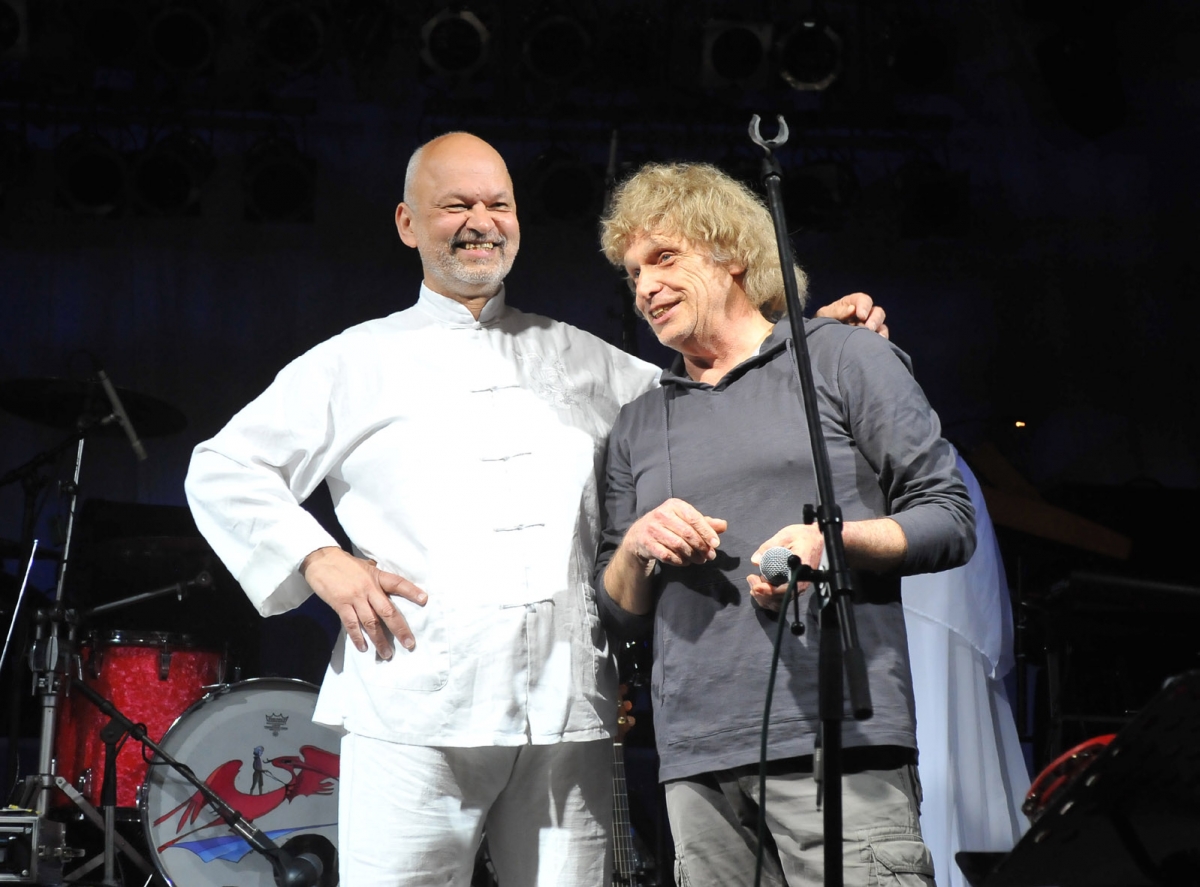
With most of the older albums all credits were for Grobschnitt. Did everyone contribute to the music?
"It has always been the foundation of Grobschnitt: everyone contributes and everyone earns the same amount of money. It doesn’t matter who wrote the music or came up with the lyrics since everything is done by us all. It’s like a socialistic regime if you will. But especially in the seventies, when the members of the band had to live of whatever income Grobschnitt generated, it seemed fair. You must know that during their whole career, Grobschnitt did everything themselves. For example, Lupo was in charge of the management, someone else handled all press related things, another member was in charge of the costumes, there was someone for the lightshow and there was one assigned to write lyrics while we all contributed to composing the music."
Eroc had quite an impressive solo career. Has he ever been involved agian with Grobschnitt after he left in 1983?
"During the seventies Eroc was very busy with all kinds of show elements and he wrote a good deal of the lyrics. Although he became the producer of other bands after he left the band in 1983, he never did the production for Grobschnitt. He did all the Grobschnitt Stories albums completely on his own and there were no other members involved at any point. He used to record studio sessions, many of them never released, and also a number of live shows and many of them were high quality recordings which he remixed and remastered. For the public Eroc is a very important name in relation to Grobschnitt, but as a matter of fact he didn’t do anything with Grobschnitt after he had left the band."
What was the reason of the change in style in the eighties?
"That happened not only in the eighties! The very first album was inspired by Santana, with two drummers and then Ballermann, much more in the vein of Genesis and Yes. Jumbo was quite different from Ballermann and when Rockpommel’s Land was released, people only wanted to hear Solar Music and shouted that Rockpommel's Land was crap! Merry-Go-Round again was very different and Illegal indeed is more rock orientated. Then came Razzia and we stopped singing in English, a huge change once more, so I’d say Grobschnitt tried to be different on all albums and never wanted to confine themselves to progressive rock or any other style. In fact this must have been very difficult for our fans, but fortunately for us it was always leveling up: fans went but others came. In the eighties, the record companies were thinking about commercial success more and more and wanted to force us to write shorter songs suitable for radio broadcasts and that’s when we decided to quit although as a band we were still willing to carry on. We weren’t inclined to become puppets of any record company!"
What did Willi and Toni do after The Last Party?
"As far as I know Toni continued to be a lightshow engineer for other artists. Willi on the other hand stopped making music or playing completely and went on to do something in gastronomy and he did quite well."
Talking about the current members of Grobschnitt: are you all professionals or is music just a hobby?
"At this point, Willi is fully involved as a professional in Grobschnitt again, the younger guys either study or have regular jobs and I teach English, so I’m not a professional musician at the moment. This is why we only play shows at weekends and we try to rehearse once a week. Actually we don’t have to play to earn a living and we play because we enjoy it. As soon as we don’t like to play shows like we are doing now, we’ll probably quit instantly."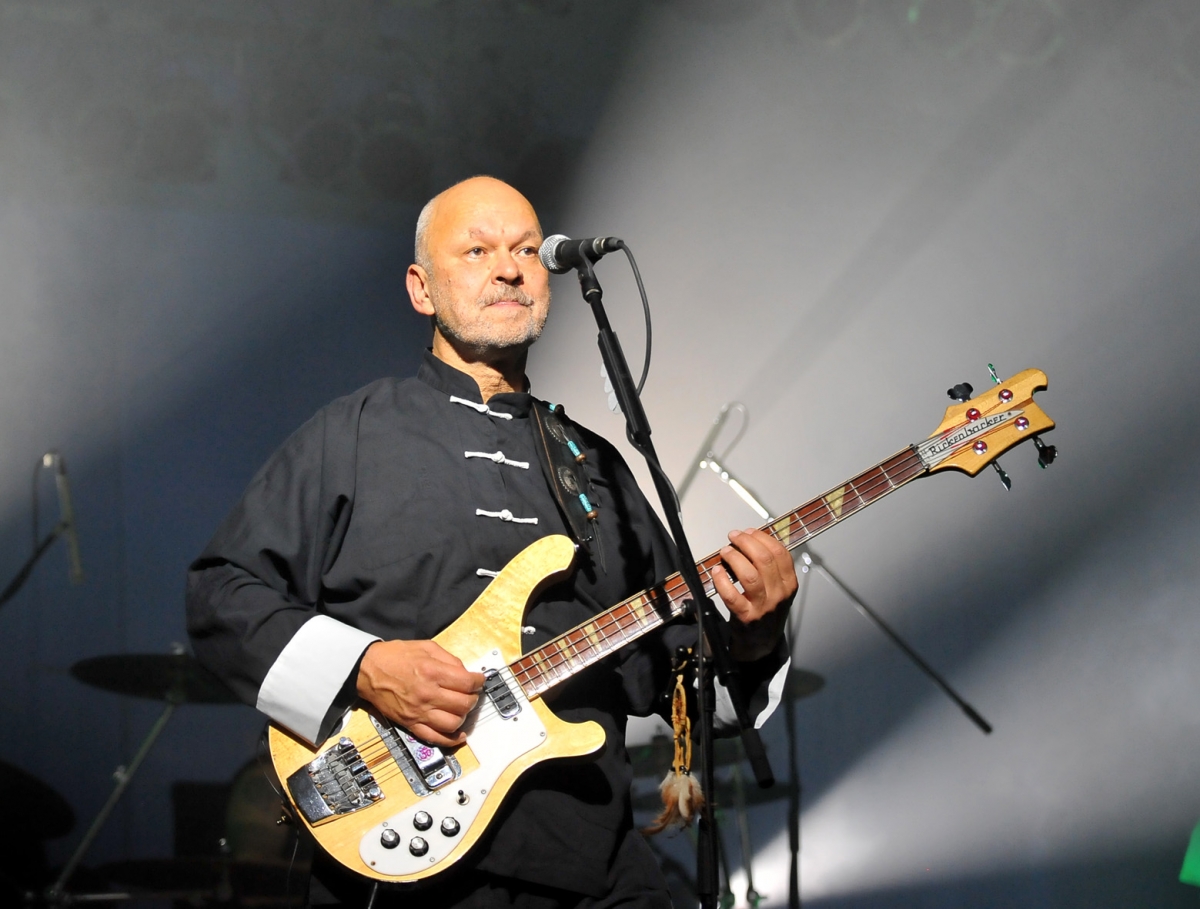
Why doesn’t Grobschnitt perform outside of Germany?
"We would love to play in the Netherlands for instance or in Belgium or France. For the time being Germany alone is big enough for us. We would need a tour operator from outside to get us shows outside of Germany and at the moment there’s no one available. For anyone who’s interested: all the necessary information to book us can be found on our website www.grobschnitt-band.de because as I pointed out, we still do everything ourselves. In my opinion one of the biggest practical problems is that our show is just too big. We cannot play club gigs in France, Belgium or the Netherlands because we would need a big stage and inevitably, and most preferably, a big audience of at least a thousand people and that would be hard to realize. If we would be playing for three to four hundred, the tickets would become too expensive. Since we like to play shows of around three hours, we rarely play on festivals, it’s just not our thing. We were invited to play on the Loreley festival but we declined because the show would be too short. The festival we did play last year was in Herzberg but that was Grobschnitt for one whole evening!"
Perhaps this is more a question for Tony but maybe you can answer it too: what kind of differences are there for a light technician comparing the seventies to the present day?
"Well, the technical side of the light shows changed dramatically. It’s all digital now and Toni makes all his preparations via computer, but he still does a great deal of work manually during the shows, as he used to do in the seventies! The reason for this is probably that we don’t play each song exactly the same way on each show and if you would have had the lightshow fully computerized, it would soon be total chaos."
Why did you eventually decide to change from English to German?
"In the seventies there were just a few acts sticking to German like Udo Lindenberg, Ihre Kinder and Novalis. In the eighties it became more common to sing in German. With Jumbo we already had a version with vocals in English as well as a separate release with vocals in German. Illegal was German and English, but still more English and then Razzia was completely in German. When we would have continued as a band our next album could have been in English again: it was not a matter of ideology, just a coincidence and the feeling it would be the right thing to sing in your own language finally. Everything in this band happened spontaneously, things were never carefully planned. This was one of the reasons it was a great thing, being part of this band."
Does Grobschnitt still perform with all the theatricals they used to use in the early days?
"Oh yes, certainly. Although tonight will be an exception. Much less theatricals and especially hardly any fire because of the small stage. In fact this is the smallest venue (600 people) we played so far! Last week we had an enormous stage at our disposal, that was great! But it’s all about music: no monologues or tales, just music and a lot of costumes, fireworks, etcetera. Usually we play venues of over 1000 – 2000 people you know like in Bonn and Berlin. Tonight I’m afraid the show is much less spectacular than in our other shows, it’s a pity!"
Did you really try to get some publicity outside of Germany in the seventies or eighties?
"No, not really Germany has always been enough for us to get by. Although we sell records outside of Germany, overseas on the Krautrock labels, in countries like the Netherlands, Brazil, UK, USA and Canada, but we never played in those countries. We played in Switzerland but not even in East-Germany, because in the seventies there was still the Iron Curtain and no one in East Germany had ever heard of Grobschnitt; the same situation in eastern Europe."
Frank Bornemann referred to Eloy's music as art-rock rather than progressive: what's your opinion?
"I agree with Frank our music may be referred to as art-rock, because I also think it’s an art, much, much more than all mainstream artists. On the other hand, if you realize what the style progressive rock stands for, you get names like Genesis, Pink Floyd or Yes and Grobschnitt has been one of the bands in Germany who helped shaping this style of music in our own country. Listening to bands like Porcupine Tree I can live with the description progressive rock as well, especially when we are talking about the album Rockpommel’s Land!"
What do you know about the whole music scene in 2010?
"Actually I think it’s becoming healthier everyday. There’s a lot of talented new bands who play music they believe in and really play instead of all the computerized stuff. Also in the progressive rock genre there are a lot of good new bands. However, there’s about a thousand styles today and I guess it’s hard for young musicians to find their way to audiences big enough to support them. The internet is a powerful medium many bands in the indie music use to publish their works and this phenomenon is causing a lot of creativity, which I think is good."
Currently there's a new live album out: why not a DVD?
"It’s because we think hearing is okay, but we would like to keep the people coming to our shows, you know. Maybe, just maybe in the future. I know our sons would love to record a DVD but the oldies are not interested yet!"
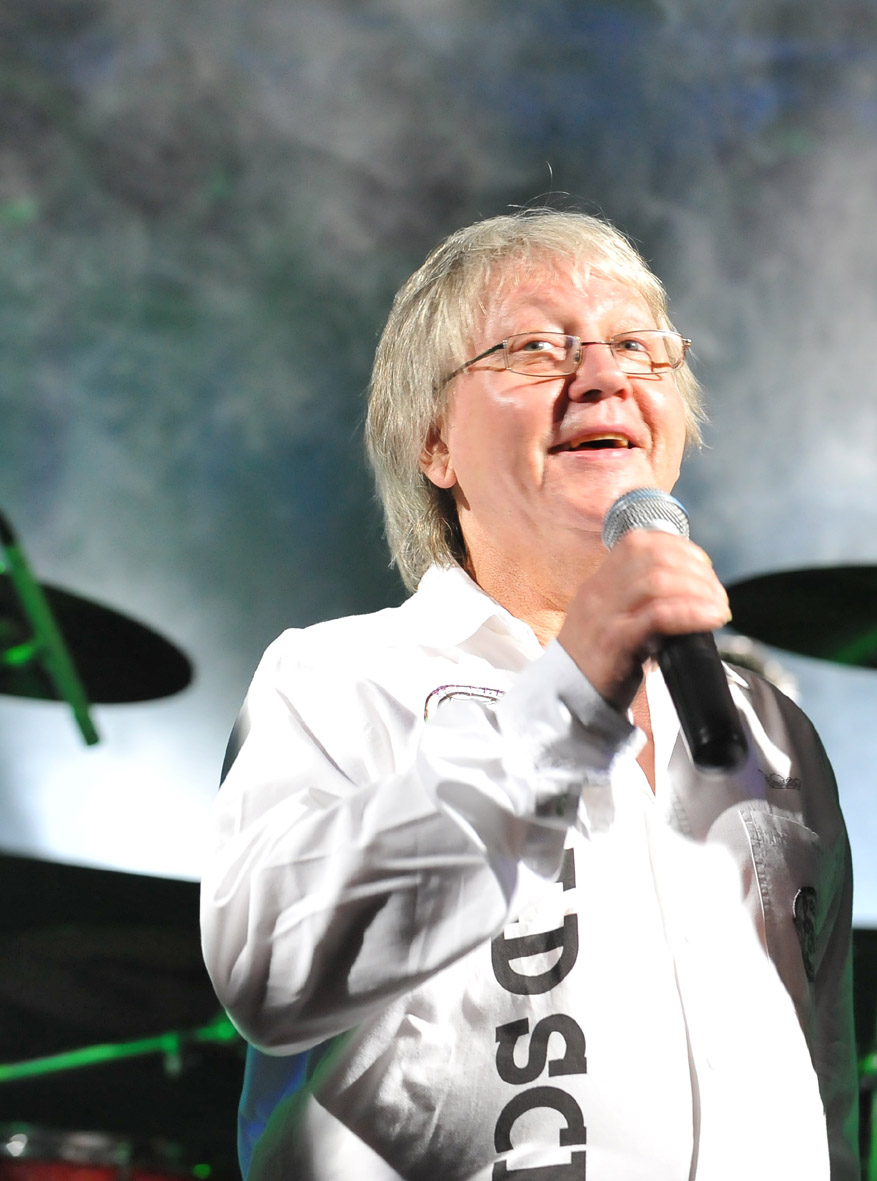 Are there any plans to record a new album?
Are there any plans to record a new album?
"Not at this point. This live album featuring Rockpommel's Land has just been released and it has a new studio track on it, so we’d like to wait a while and see what the response is like. We wanted to have a new beginning, an overture for the story, so we composed Before together. The very first number Behind was an idea to start the live show with, because we wanted to get the audience into the story and create an atmosphere. Beyond is just a little piece of music to lead the listener out of the story. The whole thing is more like a circle now. So, yes, in the future maybe a DVD or a new studio album, who knows! We don’t need to think about the future in this band, we just do what we like and we have total freedom. In the old days it was the merry-go-round sequence: tour, composing, studio, tour and so on. Now we just play what we like and more or less also when we like. For example the making of this new album was very satisfying and surely a lot of fun to do and that is a truly great feeling and a for a musician a privilege to be in such a situation."
Well Milla thank you very much. I think I’m going to rush off to the merchandise and buy your new album and I will certainly advise Dutch fans to come to the Westfalenhalle in Dortmund on the 9th of October!
"You’re very welcome! Enjoy the show!"